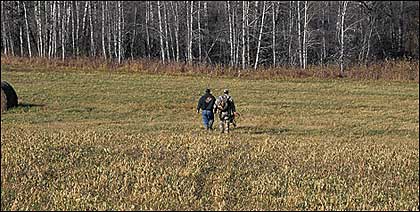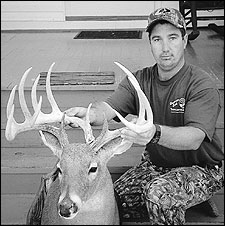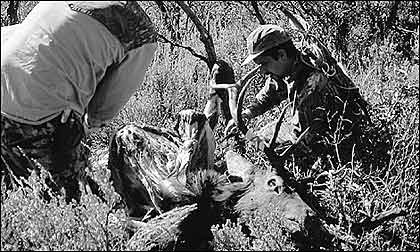October 28, 2010
By Jay Strangis
When you book with a guide, you place more than your hard-earned dollars in his hands--choose wisely!
By Jay Strangis
 A guided bowhunt used to be a phenomenon of the Western United States, for more exotic species such as mule deer, antelope and elk. Today it's easy to find whitetail outfitters across the breadth of the deer's range that take care of the details of lodging, stand placement and deer patterning and free you to concentrate on anchoring that big buck. |
I arrived at the Wisconsin whitetail camp as the sun set, unpacked my bow, unlimbered a last-light practice shot and snuggled into a warm bunk. By first light the following morning I was watching the blanket of dawn from a tree stand I'd never seen before, overlooking classic whitetail trails. "The deer will come down the trail from your left," the guide had told me. "You'll probably have a chance at a good doe if you want one (I held two tags), but watch for more deer crossing a little farther out in the clearing. You might be able to grunt in a buck."
And so it was. Within the first hour, a big doe walked right past my stand and stopped in a shooting lane. Soon, more deer were feeding through the clearcut on their way to daytime bedding areas. The outfitter was correct; I was wholly satisfied. I came to be guided, and I was getting my money's worth.
Advertisement
For many, hunting with an outfitter goes against the grain. After all, isn't bowhunting a pursuit for rugged individualists, for those who like to break away from the crowd? Bowhunting requires time, patience and a lot of self-determination. A bowhunter succeeds or fails by his own decisions and actions, and hunting with a guide cuts into that independence. But bowhunters also like to kill things more than just once in a while; and to this end, an outfitter can definitely serve a useful purpose.
There are many reasons to hunt with an outfitter. For experienced hunters, it may be the desire to go to the next level, to have a decent opportunity at the kind of trophy animals not found on the lands they have been hunting. Or, perhaps you want to pursue more exotic species, far from home. Other potential clients may be beginners, those without the skill or experience to properly hunt the game they seek. There is no shame in this. Like everyone else, they seek an opportunity. To this end a bowhunting camp provides the perfect classroom, with lots of discussion about technique and experienced guides to put hunters in a position not only to learn, but to succeed. For others, hunting with an outfitter is simply a vacation, a chance to settle into some uninterrupted days afield in prime hunting country.
Advertisement
WHAT TO EXPECT
Expecting good hunting in an outfitter's camp goes without saying. But there are a lot of services a good outfitter should provide before the actual hunting ever starts. Put simply, an outfitter should make life easier by handling all the details of a hunt from start to finish.
Months before the start of a hunt, there will be license requirements to be met, and perhaps special drawings or permits applications to be filed. Outfitters normally are helpful with such paperwork, because your attendance in camp hinges on obtaining the proper tags. Nevertheless, the outfitter should assist you with any license or special applications that might be necessary. In many cases, the outfitter may have some kind of preference that can help you get drawn in his permit area. At the least, he can acquire application forms, send them to you and advise you on how to fill them out.
 A guide may be doing your scouting year-round. Chief deer guide Fred Law at the fabulous Enon Plantation near Midway, Alabama, pinpointed the home range of this beautiful buck based on the location of its shed. The buck was killed the following season. |
Next, an outfitter can assist with travel plans, or at least point out the best, most cost-effective way to reach him. He's undoubtedly used to picking up clients at the airport, and he has a system for such; but he should communicate the plan clearly, with alternative plans if necessary, to save confusion. There is no need to start a hunt with a hassle. I remember a trip to Texas when a foul-up forced me to take a taxi to a hotel while I wondered where the outfitter was. We tracked each other down later that day, but I was prepared to spend the night sans outfitter. On a trip to Alaska, the outfitter was drunk when he picked my up at the airport. That doesn't elicit a lot of confidence in your guide.
Besides providing a courteous welcome, the outfitter should have clean quarters and a bite of food waiting. He should have facilities where hunters can clean up, and a telephone for use, if necessary. The outfitter should definitely have archery targets available; preferably a 3-D target for shooting practice points and keeping loose and a broadhead target so that clients can be sure hunting arrows are dead-on.
Food is not a luxury but a necessity in hunting camp; and most camps I've visited are, if nothing else, strong on the food end of things. Whether on the trail or at a lodge, the outfitter should provide enough chow to keep hunters happy at mealtime and snacks to keep them going in-between.
THE RIGHT STUFF
The unwritten law says that an outfitter should be able to find game. It's true. Understanding the animals in an area and knowing the land intimately are minimum requirements for being a qualified and successful outfitter. Believe me, I've been with outfitters that did not possess either of these qualities. To hunt with them was to enter a no man's land, with no hope of success.
 Many hands make light work. Guides at Eagle Spirit Outfitters, Steamboat Springs, Colorado, team up to make quick packing of the author's bull elk. After an exhausting hunt in rough country, having help with these kinds of chores makes an outfitter worth his weight in gold. |
There is, however, more to the business of guiding bowhunters than just finding game. An outfitter must also have the skills to get his hunters within bow range once the critters are found. That means an outfitter must, himself, be a good hunter, or have guides in his employ who are capable hunters. A good hunting guide is not just someone who can drive a truck and drop hunters at the next indicated spot, or someone who can wrangle horses. Good guides are first good hunters, and they must be double good to get both themselves and the client in position fo
r a shot.
The only way to find out if the outfitter you plan to hunt with can handle the hunting is to ask a hunter who has been in the field with him. Of course, you must consider that an outfitter cannot produce game on demand. Weather, time of year and the whims of the animals themselves can all have negative effects on results, but beyond those considerations your success is the guide's responsibility.
THE INTANGIBLES
Most of us consider an outfitter for the game he might bring us. We seldom think of choosing a guide as a life and death decision. Yet the person you choose to guide you in and out of the hinterlands certainly can have a direct bearing on whether you return safely, or at all. Even a guided whitetail hunt or turkey hunt can have their inherent dangers. Outfitters and guides are under tremendous pressure to succeed, and some may be willing to take risks you wouldn't take. Others are just plain careless.
| 20 Questions To Ask | 
 |

1. Would you hunt with this outfitter again? (If the answer is "No," please disregard the following questions.)
2. If you were picked up at an airport, how was the service? Was the outfitter on time? Were you made comfortable?
3. Did the outfitter have adequate archery targets at your disposal?
4. Were the accommodations clean and organized?
5. How prepared was the outfitter to put you on game the first morning of your hunt?
6. Was the outfitter prompt in picking you up from a hunting site at the end of a morning or evening?
7. Was there enough food?
8. What was the quality of the food?
9. Did you have access to toilets and showers that allowed you to take care of personal hygiene?
10. What were game populations like?
11. What was trophy quality like?
12. Did trophy quality match your expectations?
13. How would you rate the guide's knowledge of the land you hunted?
14. How would you rate the guide's hunting skills?
15. Did the outfitter take safety seriously?
16. Were all laws observed?
17. Did you get an opportunity for a shot?
18. What was the success rate while you were in camp?
19. If you could make one improvement to the camp, what would it be?
20. Do you know the name of another hunter in camp I might call? Avoid any outfitter you feel might be willing to risk your safety or good name in order to succeed. It's not worth it.
|
|
Here are a couple of examples. A few years back, I hunted with a whitetail outfitter (now out of business) in the Midwest. In the darkness of the first morning, the guide put me in a tree with old, wooden tree steps. A couple of them weren't worth putting a foot on because they wouldn't have held if you did. I wondered what might happen if I'd tried to get down from such a spot in the darkness. Later that morning, when I told the guide I didn't want to return to the stand that evening, he put me in a stand that felt like it was going to come off the tree. I was glad I'd brought my own safety belt, because none was provided.
A few years back, in Wyoming, I hunted mule deer with an outfitter that packed us in by horse but didn't bring the means to purify water, which was a necessity in the country we visited. The weather became unseasonably warm. We had to ration water, and we were all seriously dehydrated by the end of that hunt.
On a Montana elk hunt years ago, we left camp on horseback one fine September morning headed for a piece of high country some distance away. Late that afternoon, we got caught in a heavy mixture of cold rain and snow miles from camp. We faced a long, dangerous ride that could have been made easier with a stop for a warm, drying fire, but neither the guide nor I had brought any matches. Our ride lasted well into the darkness and nearly sent us into hypothermia.
Sometimes we clients jump into the risk, hoping to improve our odds for success. While bowhunting for turkeys with an outfitter one spring, the guide and I tried to drive to a blind site after days of rain. We came to a flooded stream raging over the gravel road, and I volunteered to wade in front of the truck in the dark to guide us through. I nearly lost my balance a couple of times and could have been swept into deep water had I not been able to hold my ground. Because we made it through without incident, the point seems mute now. However, in hindsight it was dangerous, and it was poor judgment for me to take the risk and for the guide to allow it.
Also, I've been in situations where the guide or outfitter asked me to cross a fence onto private land, placed me in an area I wasn't allowed to be hunting and even suggested I shoot something for which I had no tag. As hunters, we are responsible for our own compliance with laws, but we rely on an outfitter to point us in the right direction. I simply will not hunt with someone willing to compromise his standards or my own in the name of better hunting.
Of course, these stories are extremes; and though they shouldn't be discounted, they are definitely not the norm. There will always be risk in the outdoors; that is the nature of the land. Most outfitters are highly competent and amazing for their skills and good judgment.
STATUS VERSUS POTENTIAL
When it comes to choosing an outfitter, you do have a couple of different options that can have a direct bearing on the price of your hunt yet may not affect the results. That is, you can choose between an outfitter that has a big name and proven record, and you will probably pay a high price accordingly, or you can choose an outfitter that is relatively new and unproved yet has access to outstanding animals, in hopes of saving some money.
I saw this situation in Nebraska a couple of years ago, when I met an outfitter who had guided for upland birds and rifle deer for years but was brand-new to bowhunting. The outfitter had access to 100,000 game-rich acres in an area where a pair of near-world-record whitetail sheds had been found a few years earlier. Prices for his guided bowhunts seemed cheap compared to what the big camps were asking, but the young outfitter had no track record and little experience guiding bowhunters. As a result there was a risk involved, but it was one I figured was probably worth taking. I hunted the camp and saw some monstrous bucks; and though I never got a shot, I did pass on some smaller bucks and called the outing a success. Heck, I hunted a big-name, expensive, midwestern whitetail camp during the following year and had almost the same experience at about twice the price.
On the other hand, proven outfitters have hunted the same lands for years, have a success ratio that can be put into precise percentages and don't figure to give you too many sur
prises along the way. There is a price for this, but it is definitely worth the price. With a proven outfitter you're not breaking new ground, or being a guinea pig. Where you stay, where you hunt and the why and wherefore of both camp life and getting to and from the game have all been worked out. This all leaves you more comfortable, in an atmosphere that is more conducive to your success.
It goes without saying that you should check references when choosing an outfitter. If you're around hunting a lot, you'll probably hear about good outfitters by word-of-mouth. In that case, ask your source specific questions that will help you evaluate the camp. Then ask if he knows another hunter who passed through the same camp who could answer a few questions. The same hunters may have different opinions about the same camp. Certainly the best test of a camp is the opinion not of someone who filled his tag, but of someone who did not. The best bowhunting camps have returning hunters who are willing to ante up again, even though they did not fill a tag the previous year.
Finally, once you settle on an outfitter, enjoy the experience of working with him. These are good guys who love the outdoors every bit as much as you do, perhaps more. After all, they've dedicated their lives to living close to the land and guiding hunters like you. Now you get to hunt shoulder-to-shoulder with them on a daily basis. You get to learn from true professionals in real, live hunting situations where every hunt, every day is a moment in time, a lifetime experience. It doesn't get any better than this!
